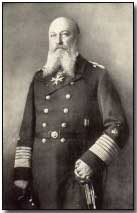Who's Who - Alfred von Tirpitz
 Alfred von Tirpitz (1849-1930) was
chiefly responsible, with the significant support of
Kaiser Wilhelm II,
for the build-up in strength of the German navy, including its submarine
fleet, from 1897 until the years
immediately prior to the First World War.
Alfred von Tirpitz (1849-1930) was
chiefly responsible, with the significant support of
Kaiser Wilhelm II,
for the build-up in strength of the German navy, including its submarine
fleet, from 1897 until the years
immediately prior to the First World War.
The son of a civil servant, Tirpitz signed up with the Prussian Navy in 1865 as a midshipman, attending the Kiel Naval School; he subsequently received his commission in 1869. Tirpitz went on to serve as commander of a torpedo flotilla and subsequently inspector general of the torpedo fleet, during which time he developed a keen interest in the potentialities of submarines in wartime.
A Rear Admiral from 1895, and having served in East Asia with a cruiser squadron during 1896-97, Tirpitz was appointed Secretary of State of the Imperial Navy Department in 1897. His appointment marked the beginning of a long close working relationship with the Kaiser, who proved eagerly receptive to Tirpitz's plans for a much-enlarged German Fleet.
Introducing the First Fleet Act in 1898, Tirpitz announced the re-organisation and build-up of the Navy. This was followed by the Second Fleet Act in 1900, which proved far more ambitious in determining to construct a fleet capable of matching the British Royal Navy, with a 17-year deadline for the completion of construction of a fleet of 2 flagships, 36 battleships, 11 large and 34 small cruisers.
Never especially seen as a practical target, Tirpitz's construction policy has been criticised for setting unrealistic expectations. It also served to alarm the British, who somewhat belatedly embarked upon their own ship-building programme, which included the launch of the innovative (and huge) H.M.S. Dreadnought in 1906.
By the time war was declared in the summer of 1914 Germany was able to muster 29 battleships ready for service against the British total of 49. Given such figures the German Fleet would patently not have been to effectively challenge the British Fleet in open action (with the Battle of Jutland the only notable Fleet action during the war).
Tirpitz was promoted Grand Admiral in 1911, and then Commander of the German Navy with the outbreak of war in 1914. In spite of the high level of support he personally received from Wilhelm II, Tirpitz, aware that the British were well ahead in terms of sea-power, remained pessimistic of the likely result of Fleet actions between the two great powers.
He consequently placed greater emphasis upon a policy of unrestricted submarine warfare construction, preferring to deplete the British fleet piecemeal and by stealth, with the ultimate intention of placing both Fleets on a more equal footing.
However the German policy of unrestricted submarine warfare proved highly controversial, most notably with the then-neutral U.S.A. Finding his policy constrained therefore, Tirpitz tendered his resignation in March 1916, which somewhat to his surprise was accepted by Wilhelm II.
Tirpitz "The Eternal" - so-named for his ability to remain in office while all around him came and went (including the Kaiser's brother, Heinrich, who having quarrelled with Tirpitz was unexpectedly removed by nominal promotion) - finally found himself out in the cold.
As leader of the right-wing Fatherland Party following the war, Tirpitz served in the Reichstag as a Deputy between 1924-28. He had however lost much of his former influence and was never again a significant political figure.
Alfred von Tirpitz died in Ebenhausen, near Munich, on 6 March 1930.
Click here to hear von Tirpitz give two speeches concerning German government and the U-boat war. Click here to read Tirpitz's official report into the British raid upon the German-held ports of Zeebrugge and Ostend in April 1918.
Prevalent dysentery among Allied soldiers in Gallipoli came to be referred to as "the Gallipoli gallop".
- Did you know?
